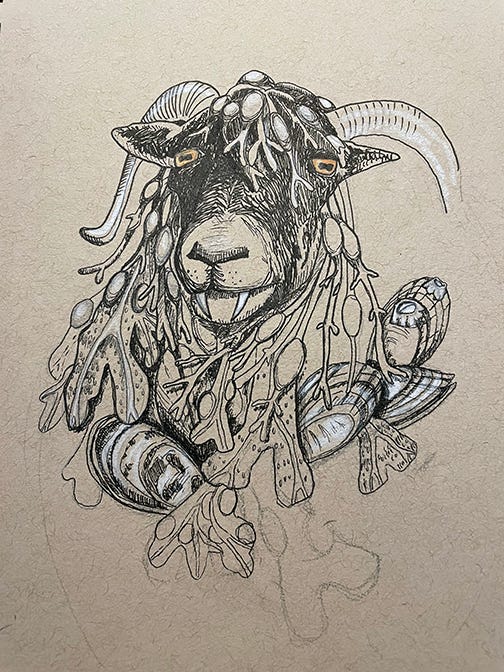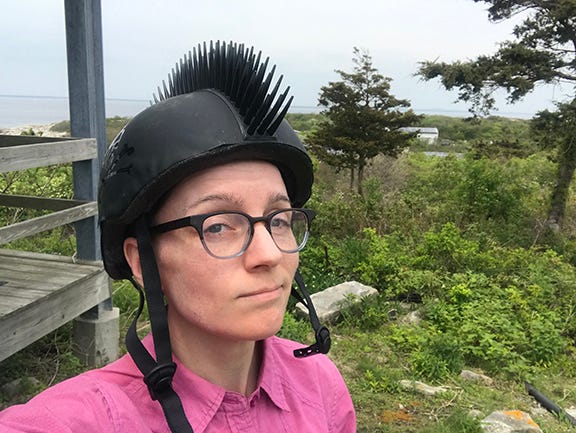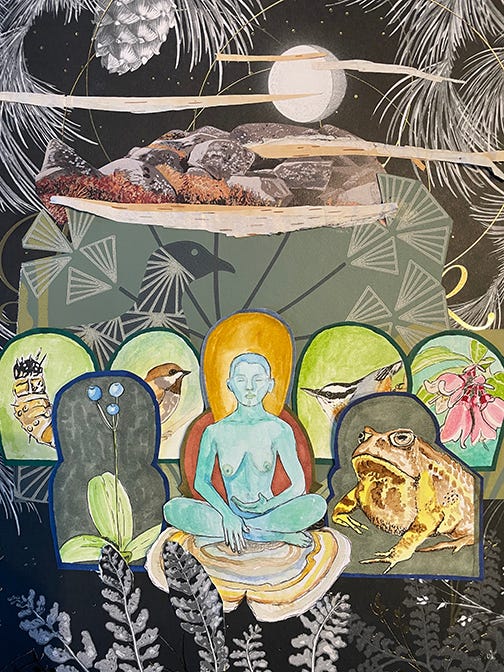In addition to the beautiful ways Sarah Courchesne melds science, art, and writing, her comments here touch on the importance of exploring our relationships with the organisms around us—however common or uncommon these organisms may be.
Sarah’s degree in veterinary medicine led her to study, among other things, Great Black-backed Gulls. We met through our mutual friend Julie several years ago, and Sarah’s work—and willingness to take on an eager-but-inexperienced young research assistant—proved pivotal in my older daughter’s life. This recent New York Times article shares other work Sarah has done to make birding more accessible.
Interview: Dr. Sarah Courchesne
How did you get started on your work with gulls?
My introduction to the gull colony on Appledore Island in Maine came in 2008, when Dr. Julie Ellis, who'd done her PhD on the gulls, invited me to come teach a class with her out there. I was, like most people setting foot on island, startled and amazed that the gulls were nesting, on the ground, hard by each trail and dirt road. They would yeow their hoarse calls of protest at your approach, but not leave their eggs. When I got to help capture and band the gulls, I was hooked forever. I've been going out each summer since, for two weeks of banding both adults and fledglings.
What do you continue to find so compelling about the gulls?
The work on Appledore was not the first time I'd ever handled wildlife—I had worked in zoos and wildlife clinics and rehabs for years—but the gull work was not in a human controlled setting like that. The trapping and banding was happening in the birds' own lands, and they were not ill or injured, but in full possession of their powers. When the Great Black-backed Gulls outstretch their wings, the span is the same as my height. They scare me, and I cannot get enough of them. I think most people who work with wildlife will admit, down deep in their souls, that whatever Important Questions of Science they are seeking to answer, they also just want to be in proximity to wildness. They want to touch it, hold it, see how near they can get to it before it flees. Catch and release fishermen are doing the same thing. Hunters who tell you they don't mind if they don't kill anything—the pleasure is in sitting in the tree stand and letting the forest seal around you and finding out what animals come near when you're still.
I could go on and on about the particular quirks and foibles and personalities of the gulls, but the truth is, I would have ended up feeling this affinity and affection and kinship for any organism I had spent this much time with, on its own terms. Getting to be in the midst of a gull colony is my particular good fortune. But had it been ants, or squirrels, or beech trees instead, I'd be able to tell you about them with the same delight and familial joy. Apply curiosity through close attention to one thing for years, and it will happen to anyone, I have no doubt.
What other aspects of your work are important to you?
I wonder how to define work here…things get murky on that front when one is unemployed. I will elect a definition: work = attention + creativity. Creativity, to me, means connecting things that were not connected before. That’s fairly abstract. The part of that abstraction that is most important to me, concretely, is probably connecting love to all the things that are too often considered separate from love, in our white-normed, patriarchal, capitalist culture. Things like science, policy, education, infrastructure. It was always easier to talk about love, about feelings, about all those messy guts when I was an English major. Once I shifted into veterinary medicine, and then into college science teaching, a lot of lights went out. The work of the humanities, of literature, is to cast yourself into other lives, try on other skins, imagine yourself into other minds. It gives you a capability for love that the sciences don’t. At least, not the way we currently approach them in our society. To wire those other disciplines for love—that’s what’s most compelling to me right now.

How are science, art, and writing part of your work, and how is the interaction between these areas important to you?
I don’t think they’re separate to begin with. I think we have to work very hard to try to keep art, science, and writing away from each other. And when we succeed, it becomes clear what a terrible idea it was. Scientific journal articles that are unintelligible to the average person; scientific illustrations with errors that illuminate a profound misunderstanding of the concept—these sorts of things show us how we’ve gotten disintegrated, as individuals, and as a society. We identify “talent” early on in kids, and then we tell them not to bother with anything they don’t have talent for. So they drop their art practice and stick to sports, or they go all in on writing and try to forget how much they loved biology.
I had a chemistry teacher in high school who told me I wasn’t cut out for science, so I became an English major. My advisor in college told me there’s no money in an English PhD and is there anything else you enjoy and I said maybe I might go to vet school and she said absolutely you should do that instead, and I did. I think my particular fascinations and interests have always circled around how to heal those wounds of disintegration, in myself, and in the world.
Is there a particular scientific or environmental problem that feels important to you? What do you do about that?
People would laugh when bell hooks would name our particular sickness as “transnational white-supremacist capitalist cis-hetero-patriarchy.” It’s a lot of syllables, and it seemed absurdly complex to them. But it’s actually very few words to describe the root cause of climate change, of police violence and the carceral state, of transphobia, of poverty, of food insecurity, of war… all of it. So, yes, the particular problem that feels important to me is that overarching and foundational problem that keeps us limited, crabbed, contorted.
On my little scale, working on it may look something like choosing to study a species like Great Black-backed Gulls, and then helping people examine why they think gulls, or any common species, are not worth studying. It’s uncomfortable, because the reasons are, at root, white supremacist reasons. It’s something I’m exploring and thinking about and writing about.
How does your identity affect your work?
I used to think I understood myself quite well. I am in my forties now, and I see that I was fairly deluded in thinking that when I was younger. This is normal, of course. I am a marginal Gen X/millennial, so I have some suspicions about all the things that used to be considered traits that have become identities. I think it’s fine and people can do what they like, and name themselves how they like, but it has been funny to me to be sort of recruited into identities I don’t, well, identify with.
Still, some of these terms have named things in me that were previously just vaguely understood weirdnesses – e.g. “agender” and “neurodivergent.” I appreciate the terms in some senses. They do make me more aware of the ways and maybe the reasons I end up out of step with the majority of people a lot of the time. I have come to see how that sense of always being at the margins, always being an observer rather than a participant, and a profound sense of solitariness is neither a universal experience, nor mine alone. Those weirdnesses have always given me a power of deep attention. Certainly, I think, they made me a writer.
What influences and inspires you?
I get excited when anyone says, “This may be TMI…” There’s no such thing as TMI to me. Like most introverts, I hate small talk, and I want to cut straight to the weirdest, deepest, most troubling stuff you’ve got. I think we suffer from far too little intimacy. That lack of intimacy gets called “politeness.” Our sense of “appropriateness” is calibrated way off.
I feel most interested and inspired by the peculiar and the particular. The specific. If you’d like a starter kit of the kind of sexy strangeness that I enjoy that you might as well, I highly recommend The Public Domain Review, Weird! the Podcast, and DAVID.
Do you have a formative experience from growing up that you feel was your 'spark' that lead to where you are now? (Question from Jenn Houle, Twig & Ink 006)
I have been remembering lately a time my class did an overnight trip to a nature camp in 5th grade. We were crouched by a stream, and I found a caddisfly larva in its little self-made log cabin. I can remember my attention narrowing to just that little creature. Everything else disappeared—in my memory I am alone, though I know I was not because a teacher-naturalist explained to me what a caddisfly was, and a dozen other kids were there. But that feeling of zooming waaay in on something, and blindering out the rest of the world, that’s a feeling I still get often. I have another mode where I zoom waaaay out and see the systems at play around us and how they structure our world. My weakness, I suppose, is that middle zone where you just are social, engaging in the basic daily interpersonal dynamics around you. I don’t really have that mode.
Thank you, Sarah!
You can learn more about Sarah and her work on her Substack and on Instagram @sjcourchesne.
Branching Out
Rooted (Stuff I like, maybe slightly off topic.):
The 89th annual autumn migration count at Hawk Mountain Sanctuary has begun!
Rounded (Preview of coming attractions.):
I am looking forward to working with the annual Wild Wonder Conference again this year. It will be held online from 13-17 September, and as always, there’s an amazing lineup of speakers and educators in store, including Amy Tan, Aimee Nezhukumatathil, Isaiah Scott, Rosemary Mosco, Yvea Moore (featured in Twig & Ink 005), Douglas Tallamy, and so many more! Tickets are good for the live event, and can also be used to view the recorded sessions at your convenience until April 2024.
Reaching (A question for you!):
Was there a ‘spark’ moment when you were growing up—or at any time—that led to your interest in science, art, and writing? (Thanks to Jenn Houle for this question!) I’d love to hear about it in the comments below!











I’m excited to find another interested in science, art, and writing, and the intersection of these! Really enjoyed the last couple interviews, need to dive into the back catalog, but thought I’d say hello 👋